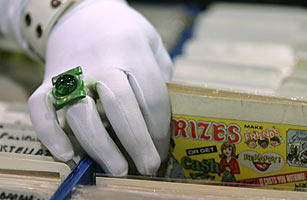
Author Kurt Andersen's new book, Reset: How This Crisis Can Restore Our Values and Renew America, examines the economic, political and cultural opportunities to be found in the wake of the financial crises. In this excerpt, the third of five pieces to appear on TIME.com, he explains why he thinks Baby Boomer culture should change to reflect the urgency of modern life.
Back in 1963 and 1964, when I was nine years old, my friends and I were all atwitter about the first X-Men comic book, the new G.I. Joe action figure, the forthcoming Star Trek series, and the Beatles. At home I wore blue jeans and20sneakers, unlike my father or any other grownup I knew, and for my birthday I wanted a set of Mattel walkie-talkies.
Now, almost half a century later, American adults are going to theaters to see new X-Men, G.I. Joe and Star Trek movies, Paul McCartney was the headliner at this year's Coachella music festival, and a new George Harrison album has just been released. At home I wear jeans and sneakers, like most other grownups, and for my birthday I got a new iPhone. Computers and GPS devices are what we have today instead of Etch A Sketches and Erector Sets and Morse-code telegraph kits. Adults of my parents' generation did not bicycle, roller-skate, or play army; adults today spend whole weekends mountain-biking, snowboarding, and dressing up in camouflage gear to fire paint balls at each other.
Waiting a while to get everything you want is — or anyhow was — a definition of maturity. Demanding satisfaction right this instant, on the other hand, is a defining behavior of seven-year-olds. The powerful appeal of the Web is not just the "community" it enables but its instantaneity: for better or worse, you can send a message now, get any question answered now, pick your airline seat now, buy anything you want right now. Cell phones and the Internet, together with FedEx and U.P.S., finally and fully satisfy the permanent child within each of us — the impulsive child with zero tolerance for waiting. And as a result, during the last quarter century, delayed gratification itself came to seem quaint and unnecessary.
This is not meant as a condemnation of maximizing fun and living casually. I am committed to wearing runner-soled shoes, watching The Simpsons and making back-of-the-classroom wisecracks on Twitter. But the rampant juvenillization of national life does echo and reinforce unfortunate habits of mind. What do the naughtiest children do? They scream and cry and tell outrageous fibs, like Glenn Beck.
The postwar generation was the first to refuse to grow up, but Gen-X and the rest have followed in their footsteps. And the selfish, heedless, if-it-feels-god-do-it approach enshrined by young boomers subsequently enabled the risk-taking, party-hearty paradigm that has governed so much of American life, economically and otherwise, for the last quarter century. Now in the twilight of their hegemony, with this crisis and the necessary reshaping of America, the boomers have their last best shot at helping to straighten out the mess they helped make. In their empty-nested years, for instance, perhaps they can channel some of the vast energies and micromanagement they lavished on their children to pro-social enterprises and volunteer work.
Read Kurt Andersen's RESET blog on TIME.com.
Read the first, second, and fourth excerpts from Reset.
Click here to purchase a copy of Reset: How This Crisis Can Restore Our Values and Renew America.
